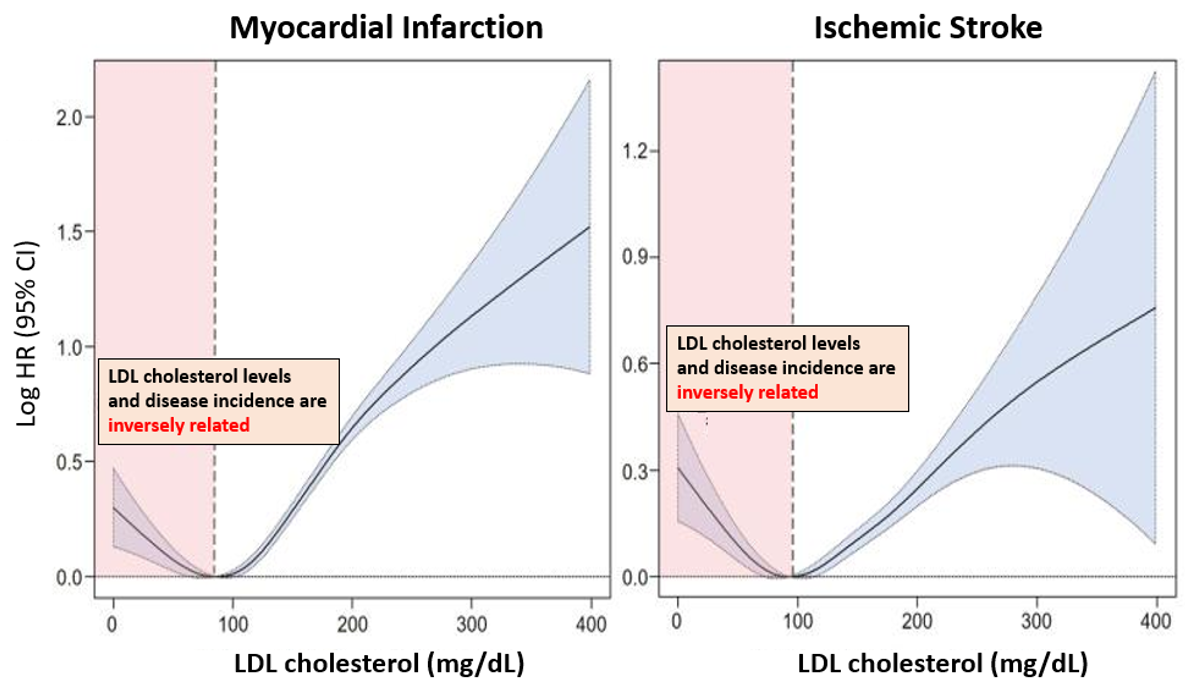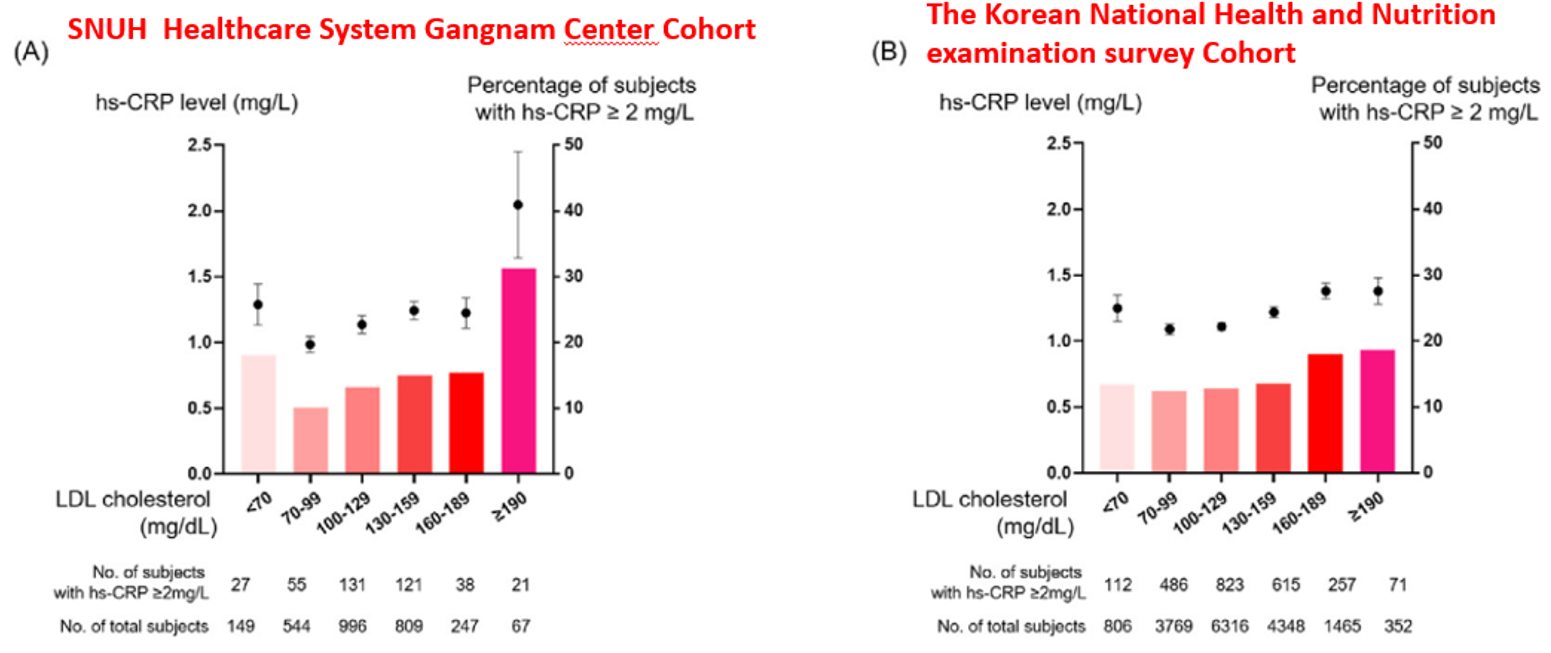Lower levels of ‘bad’ cholesterol may increase the risk of cardiovascular disease
- Confirmation of a J-shaped correlation between LDL cholesterol level and cardiovascular disease, in which the risk of cardiovascular disease increases when the LDL cholesterol level is less than 80 to 90 mg/dL
- Suggested that it is an important indicator for future cardiovascular disease management as it is related to the increase in blood inflammation level
For the first time, a paradoxical result has been confirmed by a research team in Korea that cardiovascular disease can occur more easily even when the level of LDL cholesterol, known as “bad cholesterol,” is lowered. Even people without a history of cardiovascular disease and low LDL cholesterol levels may increase the risk of cardiovascular disease due to increased inflammatory activity in the blood, so active management is needed.
On June 7th, Seoul National University Hospital Professor Yang Han-Mo, Clinical lecturer Park Chan Soon, and Soongsil University Professor Han Kyungdo's joint research team presented their research which tracked the correlation between LDL cholesterol levels and cardiovascular disease risk for about 9 years in approximately 2.43 million adults aged 30 to 75 who underwent a national health examination in 2009.
When LDL cholesterol adheres to the walls of blood vessels, it causes atherosclerotic cardiovascular disease, in which blood vessels harden and narrow. Therefore, it is an established theory in the academic world that the lower the cholesterol level, the better it is to prevent cardiovascular disease. In fact, the high-risk group for cardiovascular disease receives treatment to lower LDL cholesterol levels by taking hyperlipidemia drugs.
The research team paid attention to the clinical significance of the LDL cholesterol level in the 'primary prevention group' without a history of atherosclerotic cardiovascular disease, rather than the secondary prevention group with a history of atherosclerotic cardiovascular disease.
As a result of the national health examination, about 2.4 million adults in the primary prevention group with no history of atherosclerotic cardiovascular disease and not taking hyperlipidemia drugs were followed up for about 9 years on the risk of myocardial infarction and stroke according to LDL cholesterol levels.
As a result, a J-shaped correlation was observed in which the risk of cardiovascular disease increased when the LDL cholesterol level was lower than 80 to 90 ml/dL.

[Figure 1] J-curve shape correlation between LDL cholesterol and cardiovascular disease. Both myocardial infarction (left) and stroke (right) show a J-curve-shaped relationship with LDL cholesterol.
In addition, the research team analyzed the Seoul National University Hospital Gangnam Center cohort (2812 people) and the National Health and Nutrition Examination Cohort (17056 people) to confirm the cause of this paradoxical phenomenon.
Then, in both cohorts, a J-shaped correlation was observed between the LDL cholesterol level and the 'hs-CRP (High Sensitivity C-Reactive Protein) level', which indicates the degree of inflammation.

[Figure 2] Correlation between LDL cholesterol levels and hs-CRP (high sensitivity C-reactive protein). Both the Seoul National University Hospital Gangnam Center cohort (left) and the National Health and Nutrition Survey cohort (right) show a J-curve-shaped relationship.
In both cohorts, the LDL cholesterol ‘less than 70 mg/dL’ group had higher average hs-CRP levels than the ‘70 mg/dL to less than 130 mg/dL’ group. In addition, the proportion of people with high hs-CRP levels was also large.
It is well known that increased inflammatory activity increases the risk of cardiovascular disease. Thus, the J-shaped correlation between LDL cholesterol levels and cardiovascular disease may be due to increased inflammatory activity in the low-LDL cholesterol group, the researchers explained.
In addition, as in the existing theory, in the case of 'people who have taken hyperlipidemia drugs' and those who do not have a history of cardiovascular disease and who belong to the 'high risk group for cardiovascular disease in the next 10 years (American Heart Association guidelines)', even when they do not take hyperlipidemia drugs, a linear relationship was observed in which the lower the LDL cholesterol, the lower the risk of cardiovascular disease.
The research team explains that the conventional treatment method of lowering LDL cholesterol levels in these people is helpful in preventing and treating cardiovascular disease.
In particular, based on the results of this study, there is concern that cardiovascular disease will increase if LDL cholesterol levels are lowered by taking statin-type hyperlipidemic drugs. However, the research team explained that this possibility is very low because no J-curve was found between the LDL cholesterol level and the risk of cardiovascular disease when analyzing the statin intake group.
Professor Yang Han-Mo of the Department of Cardiology said, “We analyzed from various angles to see if there were any confounding variables or statistical errors as this result was different from the existing theory, but the results were the same. In particular, we analyzed patients with low LDL cholesterol and other diseases that are prone to cardiovascular disease, but the same was true.” He explained the significance of the study saying, “Unlike previous studies, subjects were clearly divided into primary and secondary prevention groups according to the presence or absence of cardiovascular disease history, and a large number of people were followed for a long period of time, so the J-curve phenomenon could be observed.”
He added, “What is noteworthy about the results of this study is that the potential patient group should be clarified, tracked, and managed in consideration of various risk factors in the occurrence of cardiovascular disease. In particular, even if the LDL cholesterol level is low, active efforts to prevent cardiovascular disease seem to be important for people with high levels of inflammatory activity.”
This study was published in the Journal of Advanced Research, an international journal in the field of multidisciplinary research; (IF 12.822)’.

[Pictures from left] Prof Yang Han-Mo, Dr Park Chan Soon (Clinical Lecturer) from SNUH and Prof Han Kyungdo from Soongsil University.